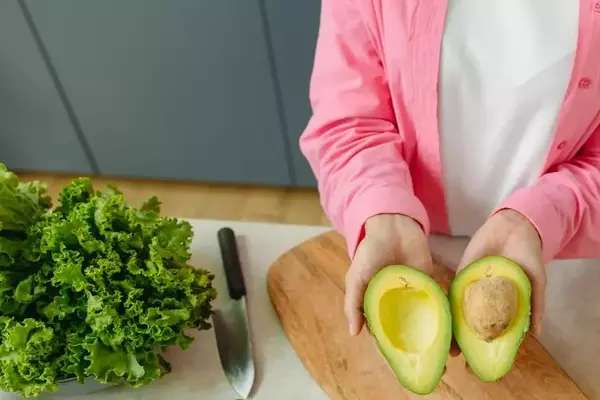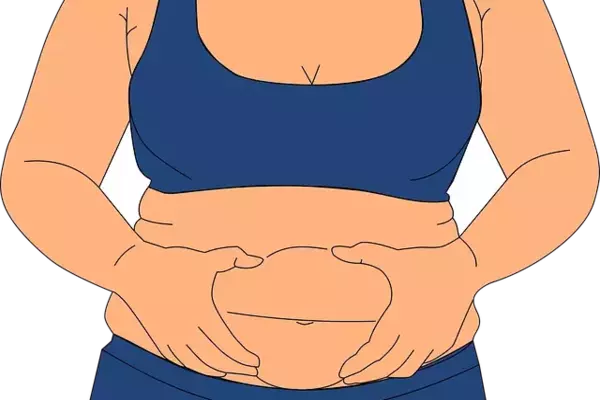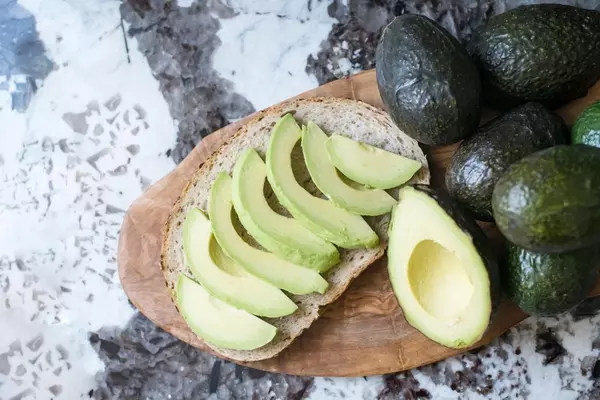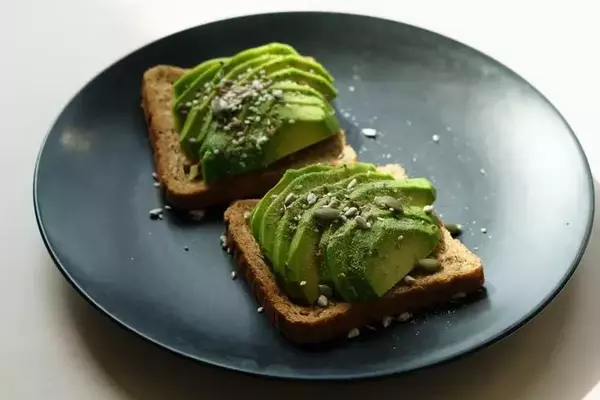A Superfood for everyone- Avocado!
Are you trying to reduce your belly fat? If you answer yes, then avocados will help you reduce belly fat. Seriously, do avocados help you lose belly fat? Shocking, huh! Here is the answer to your question,
Foods like Avocados are considered superfoods since they are a great source of fiber and healthy fats.
Also read: How Does Pineapple Burn Belly Fat?
Here’s why including this high-fat dish in your diet can help you lose belly fat. Avocados are extremely rich in fat, mostly a monounsaturated lipid called oleic acid, associated with many health advantages, including weight loss.
Therefore, 77% of their total calories come from fat; one avocado has roughly 160 calories.
In fact, avocados can support weight growth or maintenance when included in a balanced diet. In studies, oleic acid has been related to reduced inflammation and a lowered risk of heart disease. It has been demonstrated that switching to monounsaturated fat in your diet will improve heart health.
Due to their high fat and fiber content, avocados might increase your feeling of fullness and satiety. This is because the fruit’s fat and fiber components impede the passage of food through the stomach, intensifying feelings of fullness and causing you to consume fewer calories overall, which promotes weight reduction. Avocados also include a lot of soluble fiber, which has been demonstrated to decrease belly fat by curbing hunger.
Table of Contents
What is the Nutritional Value of Avocados?
A few nutritionists refer to avocados as superfoods. Because it is an excellent source of fiber, this tasty fruit offers health advantages like managing cholesterol and blood sugar. However, you might be surprised by the nutritional value of avocados.
Also read: How does Watermelon cause Belly Fat?

There are 160 calories, 2 grams of protein, 8.5 grams of carbs, and 14.7 grams of fat in 100 grams or one-half of an avocado. Magnesium, potassium, vitamins C, E, and K are abundant in avocados, including a good amount of vitamin E. The USDA has given the following nutritional data for one-half of an avocado.https://www.verywellfit.com/
| Calories | 160 |
| Fat | 14.7g |
| Sodium | 7mg |
| Carbohydrates | 8.5g |
| Fiber | 6.7g |
| Sugars | 0.7g |
| Protein | 2g |
| Magnesium | 29mg |
| Potassium | 485mg |
| Vitamin C | 10mg |
| Vitamin E | 2.1mg |
| Vitamin K | 21mcg |
Do Avocados Help You Lose Belly Fat?
Additionally, avocados’ advantages extend beyond their capacity to reduce abdominal fat. Avocados can aid in weight control because of their high levels of fiber and good fats, making you feel fuller for longer. Your body experiences fullness because of the high fat and fiber levels, which delay food from leaving the stomach.
Also read: 16 Foods that Burn Belly Fat Fast
Eat the whole fruit, mash it, or even replace cooking oils like EVOO with avocado oil to include avocados in your diet.
Best Time to Eat Avocado For Weight Loss or Belly Fat
Research published in Nutrients claims that eating avocado keeps you full for six hours later. Compared to a control meal, individuals with avocados had higher levels of hormones that reduced hunger for six hours after eating the meal. The ideal ratio of fat and fiber in the entire fruit was credited by experts as the cause of this appetite reduction. The hunger is suppressed for at least five hours after having an avocado.
How Many Avocados Per Day For Weight Loss or Belly Fat?
According to studies, those who consume fruits and vegetables often experience weight loss. One extensive observational research looked at Americans’ dietary habits. Compared to those who didn’t consume avocados, those who did often had diets that were higher in nutrients, a decreased chance of developing metabolic syndrome, and lower body weight.

This does demonstrate that avocados may easily be included in a diet that promotes health, albeit it does not necessarily imply that eating avocados made individuals healthier.
The idea that avocados should be avoided when trying to lose weight is similarly unfounded.
In fact, a significant study indicated that throughout 4 to 11 years, individuals who consistently ate avocados had a 9% lower risk of becoming overweight or obese versus those who did not.
21-Day Avocado Diet
Although it could be challenging, it’s undeniably a far more fulfilling road, and it makes perfect sense why it leads to more success for dieters.
Since it typically takes 21 days to form a habit.
For other folks, it will take more than that. However, for many people, the 21-day point will represent a radical transformation in their lives. Several programs center around a 21-day timeframe, which works for a reason.
Diet Challenge for 21 Days
DAYS 1–8: Avoid any carbs
Allow your body to properly detox and cleanse by drinking water and consuming a few carbs. Although this is the most difficult weight reduction phase, it should cause you to lose 7-8 pounds in the first WEEK! Be careful to consume a lot of lean protein and low-carb veggies.
DAYS 9–13: Vegetables and protein
It would help to boost your protein intake and veggies with few carbohydrates and fats during this time.
You could also include exercise. Exercise, especially weight training, avoids a condition known as metabolic down-regulation.
DAYS 14–21: Cycling Carbs
This week’s test should involve introducing extremely small amounts of carbs to determine how your body reacts.
Other Health Benefits of Avocado
Avocado is a single-seeded, thick, creamy fruit with a mild taste. Avocados’ size, color, and texture vary across the many types. All of them are indigenous to tropical regions, and when picked, their buttery-textured flesh softens to become edible. Indians, also known as ‘Makhanphal’ in their common language.

They contain a wealth of micronutrients, including-
Inflammatory-
Reducing qualities
Helps with weight loss
Maintain a healthy heart
Control blood pressure
Amazing for eyesight
Eliminates cancer
Improves digestion
Avocado Recipes For Weight Loss
Avocados taste amazing and can reduce blood pressure, eliminate bloating, sate appetite, and burn stubborn abdominal fat. There are several methods to prepare this cuisine, making it one of the few that can help with quick weight reduction. There are many ways to include avocado on your menu, from dips and sauces to quinoas and caprese.
Crispy Avocado Fries Baked
You might find that this creamy, crispy side dish from Chocolate Covered Katie is your new favorite. This quick and simple recipe will provide you heart-healthy monounsaturated fats without the bad saturated and trans fats that can be hidden in many commercially prepared fries since the avocado slices are baked, not fried.

Avocado Mango Spice Bites
You will adore the creamy avocado, fiery red pepper, and sweet mango, creating a mouth-watering meal. Mango is a smart pick since it provides the following:
- Extra fiber and vitamin C.
- An antioxidant that may help boost immunity and stave against disease.
- Avocado’s benefits.
Prunes with Avocado Chocolate Brownies
Compared to one cup of butter, which has 117 g of saturated fat, one cup of mashed avocado has just under 5 grams (g) of saturated fat. Prunes are a nice addition to the mixture as well. Prunes include 1.98 g of fiber and 232 mg of potassium per four pieces.

Avocado Chocolate Pudding
The avocado gives it a velvety texture and an added nutritional boost. The meager 4 g net carbohydrates per serving is good news for those following a ketogenic diet. This pudding has 87 calories, 7 g of fat, 8 g of total carbohydrates, and 1.5 g of protein per serving.
Stuffed meatloaf from Mexico
You can make a tasty, low-carb meatloaf full of flavor in only 15 minutes. In this unusual take on a classic meatloaf, an avocado is cooked to provide a creamy middle. Your family will surely like the dish if you serve it with a fresh green salad.
Conclusion
In addition to many other nutrients, avocados are an excellent source of fiber, healthy fats, vitamins C, E, and B6, potassium, magnesium, and folate. If folks insist on eating them, their diet works sheer performance may improve.
Fibre, which is crucial for a healthy digestive tract, is abundant in these. According to some research, eating avocados may enhance stomach bacterial diversity and lower feces’ bile acid content. Vitamin C, vitamin E, and the pigment lutein are anti-inflammatory and antioxidant substances abundant in avocados.
A diet high in fiber has been associated with dietary changes. According to some research, eating avocados may increase satiety, promote weight reduction, and decrease belly fat.
However, the Hass Avocado Board funds a large number of this research.
I hope you enjoyed the article Do avocados help you lose belly fat? If you have any other queries, write in the comment box.
Frequently Asked Questions
Q1: What type of fat is avocado?
Ans: Avocados are high in monounsaturated fats, an excellent source of fiber, and low in total carbohydrates.
Q2: Is avocado a protein or fat?
Ans: One medium avocado full contains around 240 calories, 13 grams of carbohydrates, 3 grams of protein, and 22 grams of fat.
Q3: Are avocados high in fat?
Ans: Since they contain a lot of fat, avocados stand out among fruits. This indicates they have more energy than various fruits and veggies.
Q4: Are avocados high in calories?
Ans: This indicates they have more energy (calories) per serving than other fruits and vegetables. To lose weight, consider the energy intake of foods like avocados, which have a higher calorie content than similar foods like broccoli or tiny oranges (about 150kcal per half an avocado against 20kcal).
Q5: Can avocados make you gain weight?
Ans: Suppose one incorporates avocado into a nutritional diet that emphasizes complete foods. In that case, worrying that it will make you gain weight is unnecessary.
